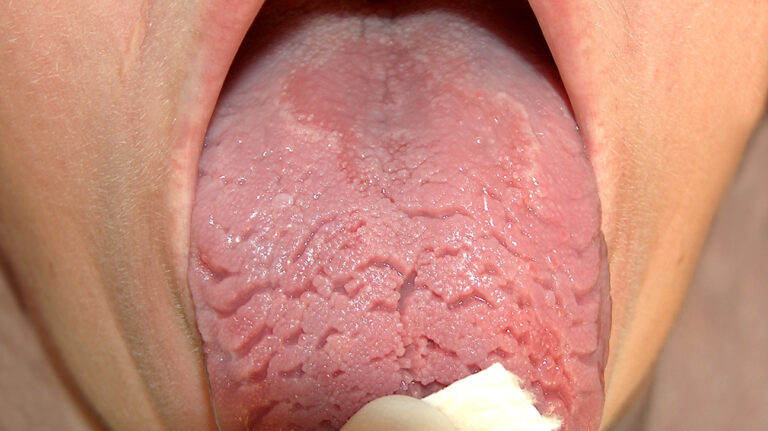A fissured tongue is when it is cracked. The cracks or grooves appear only on the dorsum (top of the tongue) and sides, not the bottom. They have different patterns and shapes and vary in depth.
It is a normal condition that may begin in childhood. It may, however, occur in adults. They also worsen with age. It is common enough with 11% prevalence in children and 40% in adults of the population aged over 40.
There is no evidence that suggests this condition affects any particular age, geographic location of the race. It is random and can affect anybody.
Signs and symptoms
A fissured tongue is no cause for concern, being painless and common. The only times it causes physical discomfort is when debris is caught within the cracks or if the cracks are too deep so that eating spicy food or food high in acid may cause burning sensation in the tongue.
Causes of a fissured tongue
What causes the occurrence the fissures is unknown, though some believe it to be hereditary.
However, there are two conditions that can be determined simply by looking at the cracks:
Geographic tongue
This is where some bits of the tongue are missing the papillae. The papillae are the series of tiny pink or white bumps that coat it. This makes the fissures that may be present more visible.
The patches heal and the recover new papillae while in another patch, the papillae fade, making it look as if it’s moving. These patches can cause pain when eating spicy, salty or highly acidic foods.
Vitamin Deficiency
Deficiency of vitamin B12 or iron can cause large patches forming on your tongue. This is because the vitamins work to mature the papillae. This makes fissures visible as well.
A Cracked tongue caused by a vitamin deficiency takes two main forms: iron or vitamin B12 (biotin). Both substances are used to mature the papillae and lacking in one or both can result in large, smooth patches developing on it.
As with geographic tongue, the smooth patches will make the natural fissures more noticeable.
The following are also known to worsen the condition
Trauma
Too much friction on the tongue can cause the cracks and fissures to worsen. This friction is caused by brushing too vigorously or any other form of intrusion.
Tobacco and alcohol
These substances irritate it and can cause cracks over time. Chewing tobacco may also cause cracks along with black and hairy tongue.
Dehydration
If you do not regularly drink water, the natural grooves in your tongue will dry up due to the lack of moisture.
Medical conditions with fissured tongue
Elverson-Rosenthal syndrome
This syndrome has no known cause, but it a rare neurological disorder that affects the face, lips, and tongue. 20-40% of the time, it results in this problem.
It may also result in Bell’s palsy where the face is partially paralyzed.
Down syndrome
80% of Down Syndrome patients also have this problem. Down syndrome is a chromosomal disorder. It affects intellectual capacity and facial features.
Sjogren’s syndrome
This autoimmune disorder causes the body to attack and fight its own glands responsible for moisture production. This means the salivary glands as well, leaving the tongue dry and cracked.
Treatment and home remedies
Water
Hydrate your mouth to prevent dryness and increase moisture in your tongue. Drink a few glasses a day as recommended.
Dietary changes
If your tongue is cracked, avoid eating food that may irritate it to prevent the burn. Eat less spicy, acidic or salty food until the cracks resolve.
In the case of vitamin deficiency, eat food high in biotin and iron. This includes mushrooms, chicken, eggs, spinach, beans, mushroom, cheese, cauliflower, almonds and all the other nutrient-rich foods. Search and research other foods that may fall into either category.
Just as well, avoid alcohol, tea, coffee or tobacco. These irritate it and may cause staining.
Dental hygiene
Regular brushing of your teeth is necessary to fight bacteria, food particles and microorganisms that hide in the gaps of your mouth and the cracks in your tongue. Use a tongue cleaner for extra help
Use a soft toothbrush to reduce friction and brush in gentle motions. You may also consider switching to a milder toothpaste. Additionally, according to this dentist who does good-quality dental implants in Chattanooga TN, you should spend at least 2 minutes in brushing your teeth.
Medication
This is only where the medical conditions mentioned above may apply. Visit your doctor first and do not self- medicate.
Depending on the condition, the doctor may offer an antibiotic or topical pain relievers.
How is a cracked tongue diagnosed?
A cracked tongue is often diagnosed during a dental examination. A dentist can visually examine the groves in it. Combines with a medical history examination, the doctor is usually able to tell what the specific condition is if there is one.

